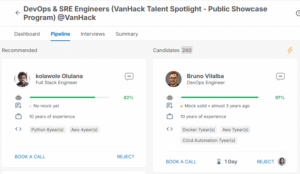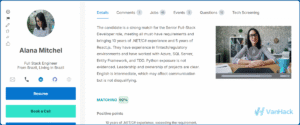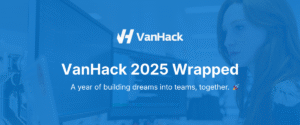For scaling startups, finding the right engineering talent quickly is a top priority. Demand for skilled engineers is growing fast in 2025, especially in fields like AI infrastructure and cloud systems, while the supply struggles to keep up as seen in global market trends. If you’re leading a Series A to Series C startup, hiring the right engineers at the right time can make or break your product roadmap, competitive edge, and overall success.
This guide offers a clear framework to help experienced leaders navigate the engineering talent market. We’ll dive into why hiring speed matters, break down current market challenges, compare building versus outsourcing talent acquisition, and share practical ways to speed up your hiring process. Traditional methods often fall short, so let’s explore what works for fast-growing startups.
Want to streamline your engineering hires? Start recruiting with Vanna now and see how AI can help you grow faster.
Why Speed in Engineering Hiring Matters for Your Startup
Delays Cost You: Missed Deadlines Hurt Growth
Unfilled engineering roles cost startups dearly in lost opportunities. When key positions stay vacant, product development slows down, features get delayed, and competitors gain ground. This isn’t just about immediate revenue, it also affects fundraising timelines and customer acquisition, putting your market position at risk.
The talent shortage makes this even tougher. Persistent gaps in skilled professionals push wages up and extend time-to-fill for senior roles in 2025 across engineering sectors. Startups with efficient hiring processes snap up top talent, while others lag behind with empty seats.
Slow hiring creates a ripple effect. Understaffed teams face burnout, quality drops, and turnover rises. Technical debt piles up when there’s no capacity to balance new features with code maintenance. Plus, longer development cycles delay customer feedback, making product-market fit harder to achieve.
Key Talent Acquisition Terms Every Leader Should Know
Getting familiar with talent acquisition concepts helps you make smarter hiring decisions. Talent Acquisition is a forward-thinking strategy that builds long-term pipelines for specific skills, unlike traditional Recruiting, which often reacts to immediate openings with standard steps.
Engineering levels also matter for assessing candidates and setting pay. Here’s a quick breakdown:
- Senior Engineers (5-8 years) focus on executing within existing systems with deep technical know-how.
- Staff Engineers (8-12 years) handle technical work and system design, collaborating across teams.
- Principal Engineers (12+ years) shape architecture, mentor others, and align tech with business goals.
Pay structures reflect these levels, with added complexity. Equity matters more for senior roles, and cash expectations have climbed, especially in high-demand markets for AI and cloud skills where demand outstrips supply. Knowing these trends helps you craft better offers and plan budgets.
Align Hiring with Your Business Goals
Your engineering hiring needs to match your business milestones for maximum impact. Product roadmaps rely on having the right technical skills at critical points. Fundraising often depends on showing technical progress and a strong team, so hiring speed directly influences investment outcomes.
Standing out in the market also ties to specialized technical skills. Startups increasingly need engineers with expertise in data-driven design or AI applications to gain an edge based on current hiring demands. Moving quickly to hire these skills sets you apart from slower competitors.
Linking talent strategy with business pace means close coordination between technical leaders, recruiters, and executives. Successful startups keep communication open across these groups and adjust hiring priorities as business needs and market conditions shift.
Understanding the Engineering Talent Market Today
Where to Find Engineers: Key Markets and Global Options
Engineering talent is now spread across the globe and often specialized by field. Big Tech draws many with strong pay and complex projects, but retention is slipping as engineers chase equity and leadership roles elsewhere. Early-stage startups offer equity potential, though they often struggle to match cash offers or define roles clearly.
Consultancies are a hidden gem for talent. Engineers from these firms bring varied industry exposure and adaptability, plus strong communication skills that fit well in startup settings. They’re used to jumping into new challenges fast.
Global hubs also offer valuable options. Latin America provides solid technical skills with time zone alignment for North American firms. Eastern Europe stands out for its strong educational base in tech. Southeast Asia is growing in AI and mobile development, often at competitive pay rates. Tapping these pools requires understanding cultural differences, communication styles, and rules around remote work or relocation. Startups that systematize global hiring while maintaining team unity see the best results.
How Hiring Has Changed: Remote Work and Tech Tools
Remote work has reshaped talent access by removing location barriers, though it brings new hurdles like team communication and cultural fit. Technology, including AI and cloud tools, is widely used to boost productivity amid labor shortages across engineering fields. This widens the talent pool but raises the bar for assessing and onboarding candidates.
AI tools are changing the game for sourcing and screening candidates. Smart algorithms match skills more accurately than old keyword searches. Automated tests provide hard data on technical ability, saving time for senior staff. Video platforms allow flexible evaluation of communication and fit without real-time scheduling.
Today’s market favors candidates, so employer branding and candidate experience are more important than ever. Engineers value learning opportunities, clear growth paths, and meaningful work over standard perks. Pay rates are climbing fast, especially for skills in AI, cybersecurity, and cloud systems.
Why Old Hiring Methods Don’t Work for Startups
Job boards often flood you with applicants, making it tough to spot the right technical talent amid the noise. Generic referral programs tend to bring in similar profiles rather than fresh skills or viewpoints.
High-fee recruiting agencies often prioritize volume over fit, leading to costly mismatches. Many lack the technical depth to evaluate engineering skills properly. Their rigid processes don’t flex with a startup’s changing needs or fast pace, and long evaluation cycles mean losing top candidates to quicker rivals.
New Ways to Reach Specialized Talent
Accessing niche talent globally is now key to staying competitive. Companies need to regularly update hiring strategies to connect with these focused pools to address specific skill gaps. This means engaging with technical communities, joining specialized forums, and staying visible in professional networks.
Building ties with communities can involve contributing to open-source projects, sponsoring meetups, or speaking at industry events. These efforts create real connections with potential hires while showcasing your company culture. Sharing technical content through blogs or podcasts also draws in candidates by highlighting your expertise.
Your employer brand needs to clearly show the technical challenges, growth potential, and impact of working with you. Engineers want roles where they solve real problems and build skills. Startups that communicate this well attract stronger candidates and close hires more effectively.
Need help connecting with global talent? Chat with Vanna now to find pre-vetted engineers from around the world using AI matching.
Build or Outsource: Choosing Your Talent Acquisition Path
When to Build an In-House Recruiting Team
An in-house recruiting team offers deep alignment with your culture and technical needs over time. Internal recruiters understand your team dynamics and fit criteria in ways external partners can’t match. They also maintain consistent branding and build lasting candidate relationships.
Investing in internal recruiting pays off when you’re hiring at a steady volume, like 20 or more engineers yearly. The cultural fit benefits shine for senior roles where long-term alignment matters most. However, internal teams often struggle to tap niche talent pools or keep up with fast-changing market trends. Plus, developing technical assessment skills and onboarding new recruiters can take 6 to 12 months, delaying critical hires.
When to Partner with External Experts
External recruiting partners bring instant access to specialized knowledge and networks. Firms focused on tech hiring offer market insights and skills that would take years to build internally. They adapt quickly to shifting priorities without locking you into long-term costs.
Executive search firms are strong for senior hires, using established connections and expertise in complex pay negotiations. Their high fees and slower timelines, though, may not fit startup budgets or urgency. Talent platforms or subscription services strike a balance, offering global access and streamlined processes at predictable costs, ideal for scaling teams.
How to Measure the Value of Your Hiring Approach
Full-time recruiters cost between $80,000 to $150,000 in salary, plus benefits and tools. With 15 to 25 hires per year, that’s $4,000 to $10,000 per hire before overhead. Agency fees, at 20 to 35 percent of first-year pay, mean $30,000 to $70,000 per senior engineer, with varying success based on role and competition.
Subscription models offer steady costs, like $3,000 monthly for unlimited hires, which works well for multiple hires in short windows. Track metrics like time-to-fill (aim for under 45 to 60 days), hire quality via performance and retention, offer acceptance rates (target 85 percent or higher), and impact on product delivery through sprint and feature timelines.
VanHack: Your Path to Fast Engineering Hires
Vanna: AI-Driven Recruiting for Startups
Vanna uses AI to simplify engineering hiring by automating sourcing and initial screening. Powered by an advanced language model, it matches job needs to candidate profiles with precision, looking beyond keywords to understand skills and context.
Drawing from a database of over 500,000 tech professionals, Vanna analyzes verified skills, pay expectations, and relocation preferences. Instead of hundreds of resumes, it delivers a shortlist of 3 to 5 top matches per role. Smart features move candidates to review stages automatically, letting you focus on evaluation, not sorting.
VanHack’s Detailed Candidate Vetting Process
VanHack’s vetting digs deep into technical and communication skills before you invest interview time. This multi-step method gives clear insights efficiently. Here’s how it works:
- Video Introductions: Candidates record 1-2 minute clips discussing experience and goals, letting you assess communication and fit early.
- Coding Tests: Using standard platforms, these provide hard scores on technical skills, removing guesswork.
- AI Technical Interviews: Candidates answer role-specific questions in 30-minute async sessions with an AI interviewer. You get videos, transcripts, and scores to review thought processes without scheduling.
Subscription Model for Cost Control and Scale
VanHack’s $3,000 monthly subscription allows unlimited hires via Vanna, far below agency fees. Some startups have hired 7 engineers for $9,000 total, versus over $100,000 with traditional agencies. This predictable cost supports rapid team growth without budget surprises.
Simplified Global Relocation Support
VanHack handles international hiring challenges with full relocation services. In-house experts manage visas for candidates and families, a process worth about $5,000, included in the fee. Coordinators assist with housing and schools, while local WhatsApp groups help new hires settle into communities.
Your Hiring Journey with VanHack
Start with a choice between success-fee or Vanna subscription options. Onboarding calls define role needs, and shared Slack channels keep communication flowing. AI and human expertise source from VanHack’s pool, delivering 3 to 5 top candidates. A dashboard shows video intros, interview recordings, and test results. For global hires, the mobility team handles logistics and immigration.
Ready to try this efficient process? Find top talent with Vanna and start building your engineering team now.
Common Mistakes to Avoid in Scaling Your Team
Relying too much on personal networks limits diversity in skills and ideas. Referrals can signal cultural fit, but they often miss out on specialized talent needed for emerging roles like AI or cybersecurity where demand is high.
Ignoring the challenges of global hiring can lead to legal and operational issues. International hires involve complex tax, labor, and immigration rules. Without guidance, startups risk costly errors, delays, and damage to their reputation from poor candidate experiences.
Overlooking candidate experience loses top engineers to faster, clearer competitors. High-demand talent juggles multiple offers, so slow responses or vague timelines lead to rejections. How you treat candidates reflects your culture and affects your standing in tech circles.
Sticking to outdated hiring plans as markets shift puts you behind. Static strategies don’t keep up with evolving tech needs or candidate expectations. Failing to update pay to match market rates for expanded skills also drives talent to rivals.
Weak technical assessments are another trap. Generic or outdated interviews miss real problem-solving ability, leading to bad hires that cost time and money to replace. You need current, role-specific methods for accurate evaluation.
Lastly, neglecting diversity and inclusion shrinks your talent pool and risks cultural imbalances. Varied perspectives fuel innovation in engineering teams, so prioritizing inclusion widens your access to talent.
Answers to Your Startup Hiring Questions
How Does Vanna Cut Costs Compared to Traditional Recruiters?
Vanna’s $3,000 monthly subscription covers unlimited hires, unlike agency fees of 20 to 35 percent of first-year pay. Startups have hired 7 engineers for $9,000 with Vanna, compared to over $100,000 via agencies. This fixed cost aids budget planning for growing teams.
How Does VanHack Verify Candidate Quality?
VanHack uses AI matching and layered assessments. Candidates submit video intros for communication checks, take standard coding tests, and complete AI-led technical interviews with scores. The system reviews over 500,000 profiles to shortlist 3 to 5 strong matches per role.
Can VanHack Support Relocation to Canada or Europe?
VanHack excels in global moves, focusing on Canada and Europe. In-house experts manage visas for candidates and families, handle housing and school logistics, and connect hires to local networks via WhatsApp groups, covering the full relocation journey.
What Engineering Roles Does VanHack Focus On?
VanHack targets senior software engineers with 5 to 10 years of experience in Full-Stack, Backend, and Frontend roles. The talent pool fits startup needs, bringing adaptability and problem-solving skills crucial for scaling teams.
How Fast Does VanHack Deliver Qualified Candidates?
VanHack’s AI matching provides shortlists within days of receiving job details. Pre-vetted profiles and detailed assessment data speed up evaluations, cutting time-to-hire well below typical industry averages for engineering roles.
Want to speed up your engineering hires? Start hiring with Vanna and build your technical team efficiently.
Wrap-Up: Drive Startup Growth with Smart Hiring
In 2025, engineering talent demands new hiring strategies. Old approaches don’t match the speed or accuracy needed in today’s market. Skills like cybersecurity and AI are now essential for many roles as digital needs evolve. Success comes from using tech, global reach, and expert support.
VanHack’s AI tool, Vanna, offers precise matching, thorough vetting, predictable pricing, and relocation help. This equips startups to build strong engineering teams quickly. Fast, quality hiring also speeds up product work and boosts technical strength, a key edge when talent is scarce.
The future favors startups that blend hiring speed with quality, cost control with vetting depth, and global access with smooth onboarding. VanHack lays the groundwork for creating engineering teams ready to deliver on your vision and support growth.
Ready to rethink hiring? Start with Vanna today and see how AI recruiting fuels your startup’s progress.



